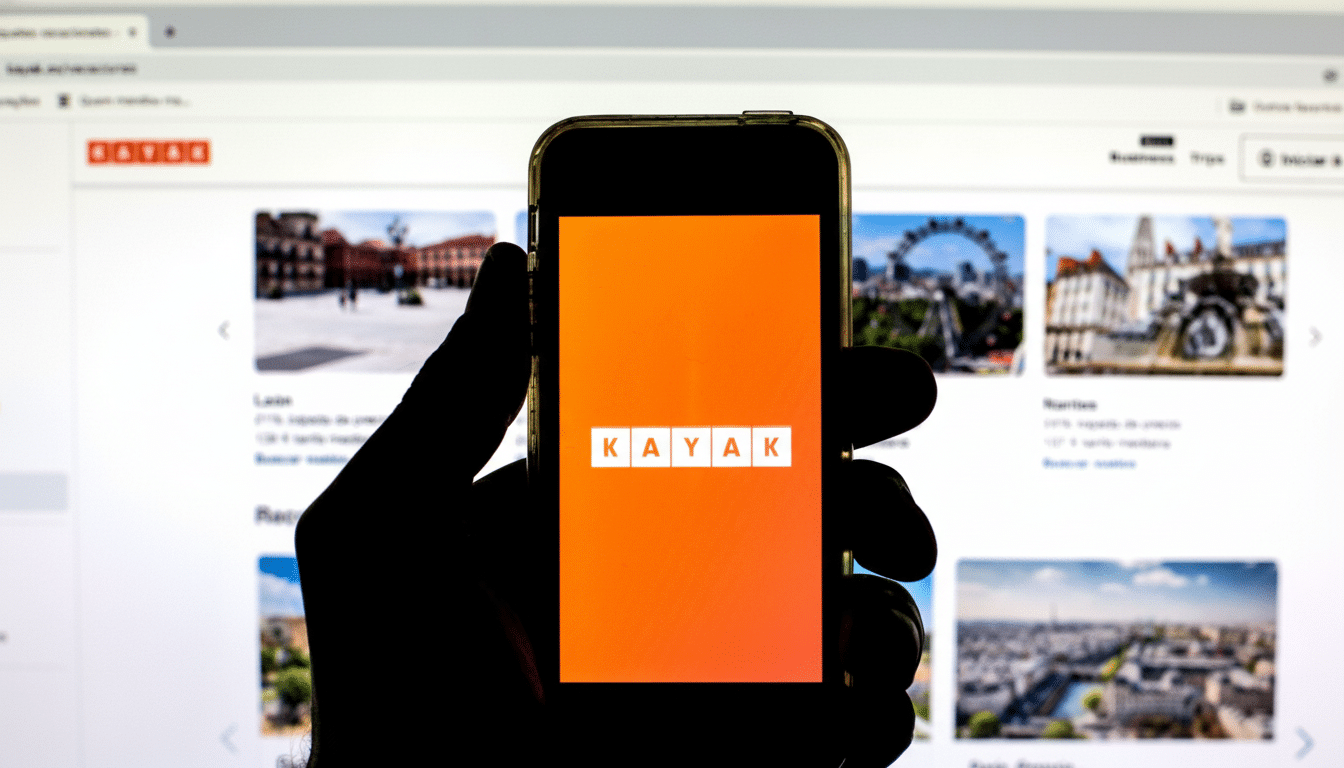Kayak has launched a feature called AI Mode to ask natural language questions, filter down options, and complete flight, stays, and rental car bookings all within one conversation.
The offering lives directly on the company’s site, on desktop and mobile web, and is something of a chatbot interface mashed together with the top of the travel funnel, at the point when someone clicks to purchase.

Instead of juggling tabs and filters, users can tell the search engine what they’re trying to do — say, find a nonstop flight under a target price, compare hotels by amenities, or plan a quick getaway with flexible dates — and get back results tailored to those constraints. The offering is an extension of Kayak’s previous AI experiments and bakes the tooling into its main product.
What Kayak’s AI Mode Really Does for Travelers
The chatbot responds to plain-English prompts and spits out structured search results scraped from Kayak’s metasearch inventory. Ask for “beach destinations from Chicago under $300 round-trip next month,” “pet-friendly hotels with late checkout near Lisbon’s city center,” or “compact cars at LAX with free cancellation,” and the assistant homes in on related choices.
It also handles open-ended brainstorming. Travelers can state “I want to celebrate New Year’s with nightlife and warm weather” or “find a long-weekend escape no farther than a three-hour flight,” and the assistant will suggest destinations, price ranges, and best travel windows based on historical and real-time pricing signals.
Importantly, AI Mode doesn’t end with inspiration. It carries the conversation from comparison to checkout so users can seamlessly transition from ideas to inventory with no need to reapply their filters. That seamlessness is designed to minimize friction in long, easily forgotten searches.
Under the Hood: How Kayak’s AI Mode Actually Works
AI Mode combines a large language model — in Kayak’s case, it integrates with ChatGPT — with the company’s pricing and availability data. The model decomposes intent and weaves free-form questions into structured queries; Kayak systems deliver live results that the assistant can summarize, re-rank, and refine while the user is asking follow-up questions.
The design reflects the guardrails shoppers care about: the assistant can respect hard constraints (nonstop only, a specific cabin class, or refundable rates) and call out trade-offs (a cheaper fare for a longer layover, or a smaller room in exchange for a perfect location). According to Kayak, the next steps for AI Mode are language expansion and voice interactions, as well as expanding to other platforms.
Why Kayak’s AI Mode Matters for Planning Your Trip
Travel planning continues to be largely fragmented. According to a recent study from Phocuswright, travelers will often touch more than a handful of websites and apps before they book; that journey is ripe for drop-off and decision fatigue. A conversational layer can compress that into less work, allowing people to describe intent once and iterate quickly.

The timing also comes amidst a more general move to AI-native browsing. McKinsey estimates that generative AI has potential to contribute trillions in annual value in multiple sectors and that customer-facing applications — recommendations, personalization, and support among them — are some of the most immediate. In travel, where options are numerous and prices constantly fluctuate, even small decreases in search friction can have a material impact on conversion and satisfaction.
There’s also a scale story. Passenger numbers are back near pre-pandemic levels, according to groups like IATA, and more consumers are shopping at once. Anything that helps users make faster, more informed decisions can greatly reduce the strain on your customer support while increasing the likelihood that shoppers will get to a booking.
Competitive Context and Strategy in Travel Search
Travel’s 800-pound gorillas are rushing to integrate AI at various layers of the stack. Expedia Group and Booking.com have introduced assistants to work within ChatGPT, enabling people to plan trips inside a third-party interface. Trip.com’s TripGen and Priceline’s Penny illustrate the power of conversational shopping to deliver cross-sell and loyalty inside owned channels.
Kayak’s method helps maintain ownership of the assistant within its site, and there are two good reasons for this. First, it allows you to own a relationship with people during high-intent uses versus farming out discovery to other platforms. Second, it offers first-party insight into how travelers pose requests and where they stall, the type of data that can be fed back into ranking, merchandising, and product design.
The metasearch model is particularly good for an AI front end: it already compiles fares and rates from airlines, hotels, and online travel agencies so the assistant can combine wide coverage with narrow personal strictures. If Kayak can consistently turn open-ended queries into concrete, bookable itineraries, it reinforces its place as a starting point for travel decisions around the Booking Holdings family of businesses.
What to Watch Next as Kayak Expands Its AI Mode
Three questions will determine impact.
- Does conversational discovery drive more conversion compared to traditional filters and grids?
- Can the assistant stay accurate and transparent amid inventory that changes by the minute?
- How will it adapt when voice, multilingual support, and richer context (like knowing loyalty status or preferred aircraft seat) are added to those capabilities?
For now, AI Mode simply turns Kayak’s search box into an oracle that can answer “where, when, and how much” in one place. If it (and solutions like it) reliably shave the distance between idea and itinerary, it won’t simply be a novelty — many travelers will consider it the way they start every trip.

